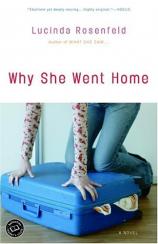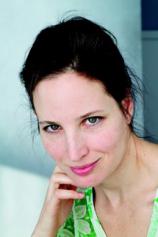Excerpt
Excerpt
Why She Went Home

1
At sixty-five, despite waning lung power, Leonard Milton Fine was still lead oboist of the Newark Symphony Orchestra. He was also one of few musicians in the troupe whom Newark's car thieves hadn't scared off from driving to work; he figured his 1986 Yugo hatchback wasn't tempting even for spare parts. On the evening of the NSO's season opener, he set off down the New Jersey Turnpike with a full car. Next to him in the front, a lugubrious cellist wearing loafers that looked like bedroom slippers stared blankly at the toxic plumage of two dozen industrial smokestacks, which was bleeding into a violet and gold sunset. In the back, Leonard's younger daughter, Phoebe, barely visible beneath a battered cello case covered with stickers from obscure music festivals, attempted to make conversation with the cellist's flute-playing wife, a dark-browed blonde who seemed to have memorized the seating chart of every musical ensemble in the tristate area. Phoebe's left ear was pinned against the neck of the case. As uncomfortable as she was, she considered herself lucky not to be sitting up front, in the death seat. Her father had the alarming habit of turning around while driving to talk to the passengers behind him. Earlier in the trip, while availing them of his many superlative buys on raingear at Burlington Coat Factory, he had narrowly avoided scaling the turnpike divide and then swerved into the middle lane, where he nearly got swiped by an eighteen-wheeler.
"Jesus, Dad!" Phoebe had cried, even though they were both secular Jews.
"Sorry there, folks." Leonard had sounded incongruously cheerful after veering out of danger.
"Trying to give us a scare there, Lenny?" the flutist had asked. "Anyway, as I was saying, apparently Trudie Fisher is now playing third chair at the Pops, if you can believe it. I really can't. The woman is always out of tune."
"It's amazing there's any air left to breathe in this state," the cellist had muttered to himself.
Leonard's driving didn't improve much after they got off the highway and made their way through downtown Newark. After almost shearing the door off a parked police car, he just missed mowing down a group of teenage boys playing stickball in the street. Eventually, to everyone's relief, they arrived at the auditorium. Leonard found a parking place just around the corner, in front of a boarded-up crack house, and the four of them dispersed --- the musicians through the stage door and Phoebe through the main entrance into the lobby. There, she spent the fifty minutes until showtime skimming a work of "women's fiction" from the 1970s she'd grabbed off her parents' bookshelf before leaving --- to her surprise and chagrin, she was unable to locate a single sex scene --- and perusing the arriving crowd, who were mainly old and feeble and white-haired (if they had any hair at all) and were yelling "Whaaat?" at each other as they futilely adjusted their hearing aids. There weren't too many of them, either.
Indeed, as she settled herself into the first row of the mostly empty balcony, Phoebe was distressed to discover that, with the orchestra and the full chorus, there were twice as many people onstage as there were in the audience. Even more depressingly, a high percentage of those in attendance were probably nonpaying friends and relations of the musicians, such as herself. She hadn't always empathized with her father's setbacks. During her college years a decade earlier at Hoover University, when she saw the world primarily through the lens of race, class, gender, and sexual orientation (mostly her own, but still), she had even reveled in the NSO's consistently paltry turnout, since the orchestra bore the name of a predominantly Hispanic, Arab, and African-American city, despite being an almost exclusively Asian and Caucasian organization. Never mind the fact that the music they played had all been composed by dead European males. Or that the structure of the orchestra was, by design, inegalitarian. Or that the house auditorium was, in fact, a converted mosque.
More recently, however, Phoebe had decided to try and bolster her father in the twilight of his musical career --- a career that was already, by nature of the kind of music he played, obscure. In addition to having trouble blowing into his oboe, Leonard was finding it difficult keeping time and, by association, track of where he was in the score. While he'd never been a virtuoso --- never been that good --- it physically pained Phoebe to imagine her father lost in a sea of notes. She found his incompetence a little pathetic, just as she had always found everything about her father simultaneously endearing and exasperating. At the same time, after a lifetime spent dreading his classical music concerts, she had begun to look forward to them, if only for the opportunity they provided to sit in a chair doing absolutely nothing for two hours and not feel guilty about it. (Domestic plane travel, she'd found, offered similar comforts.)
One glance at the evening's program changed her feelings on the subject. First up was Gustav Mahler's "Resurrection" Symphony in D minor. If Phoebe remembered correctly from her teenage days playing second violin for the All County Orchestra, it was a bombastic monstrosity. Back then, of course, classical music had only been a burden, a built-in inadequacy, a zombie motion she went through to please her parents. It had never entirely lost that quality, though it had gained others as well. In Brahms, she had come to hear the tragedy of it all; in Chopin, the excruciating tremolo of lust in the spring. But there was something so inescapably pompous and irritating about the whole penguin-suited business. It was only in the dark, or when she closed her eyes, that she could even hear the music --- the mystery and beauty that had outlived its own century.
Still, she was curious to lay eyes on the NSO's new conductor, a certain Roget Mankuvsky. According to the program notes, he was not only the youngest conductor ever to perform with the NSO, he had studied with the great Uli Rindfleisch in Vienna, followed by the lesser-known Heinz Zimmerfenster in Berlin. Barely two years later, Mankuvsky became the assistant conductor of a small early instruments consortium in Lausanne, Switzerland. Then, at just thirty, he had been appointed the musical director of the Cherry Hill Community Orchestra. To Phoebe, who at twenty-nine had not yet decided whether she was a breakfast person or a lunch person, Mankuvsky seemed like a prodigy. (The verdict: neither and, at the same time, both.)
At two minutes past eight, a flock of late-arriving concert-goers having failed to materialize, the NSO's slinky Japanese-American concertmistress, Nanette Yamaguchi, appeared onstage in a wraparound dress that gave full play to her protruding clavicles. The way she swung her hair around while bowing the tuning A showed that she lorded her power over the other orchestra members. That could have been me, Phoebe thought to herself, while also realizing how glad she was that it wasn't. Mankuvsky came out shortly afterward. He was short, dark, stocky, and not particularly handsome, with bulging eyeballs and a mashed-in nose. He bounded onto the podium in brown shoes, his ruffled shirt only half tucked into his concert tails, his spiky hair sticking out of his head. From the back, he looked like a sea anemone.
His conducting style, as it soon emerged, had more in common with the bat-trapped-in-the-attic type of flailing made famous by Leonard Bernstein than it did with, say, Fritz Reiner, the old conductor of the Chicago Symphony, whose hand movements were so miniaturized that it was once said, "When he reaches the third button, it's a downbeat." (For her twenty-ninth birthday, Phoebe's parents had presented her with a gossipy book about the great conductors.) But Mankuvsky's gestures were so overwrought as to make even Bernstein seem repressed. While the cymbals clashed and the triangles dinged, he manipulated his body into strange pretzel shapes. His need to express himself wasn't limited to body language, either. While the guest soprano strained for an F sharp, Phoebe could have sworn she heard the words "fucking migraine" wafting off the podium.
The audience sat politely and with limited squirming for the entire symphony, causing Phoebe to wonder if they weren't just deaf but dead. On the other hand, they performed the usual number of holus-bolus coughing fits between the symphony's five movements, thereby demonstrating that they were still breathing. Phoebe also wondered why it was that the sound of one person exorcising phlegm incited others to do the same. (Of the many things that baffled her about this world, that one ranked in the top ten, along with how all those plastic bags wound up dangling from trees. Seriously, who put them there?)
It seemed to take a lifetime to get to intermission, and the second half of the concert seemed just as long. It was an arduous journey through late-nineteenth- and early-twentieth-century Czechoslovakia, beginning with the dissonant strains of Dvorak's "Slavonic Dances" and ending with an orchestral suite from Janá?cek's infrequently performed (for a good reason) opera, The Cunning Little Vixen.
At the end of the evening, the applause was tepid, ex- cept from a community college music appreciation class seated downstairs in the orchestra section. They howled with approval --- probably out of relief that the show was over, Phoebe thought. Still, she was thankful that her father had made it through the program without incident, taking his entrance cues when necessary from his far-younger deputy, Benson Smith. With a shudder, she remembered the time, a year before, when Leonard had lost his place playing Prokofiev's Peter and the Wolf --- the stun-gunned look that had overcome his face and hands, his eyes buggy, his mouth frozen around his mouthpiece. Phoebe hadn't been sure if the conductor had noticed or not, but Benson surely had. He could have removed a finger from his keys long enough to point Leonard to the right bar, but he hadn't bothered.
Excerpted from Why She Went Home © Copyright 2005 by Lucinda Rosenfeld. Reprinted with permission by Ballantine Books, a division of Random House, Inc. All rights reserved.
Why She Went Home
- Genres: Fiction
- paperback: 336 pages
- Publisher: Ballantine Books
- ISBN-10: 081297171X
- ISBN-13: 9780812971712







